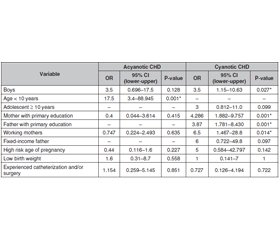Журнал «Здоровье ребенка» Том 20, №4, 2025
Вернуться к номеру
Поведінкові розлади інтерналізації в дітей із вродженими вадами серця
Авторы: Siti Annisa Dewi Rani, Irwanto, Taufiq Hidayat
Faculty of Medicine Universitas Airlangga, Surabaya, Indonesia
Рубрики: Педиатрия/Неонатология
Разделы: Клинические исследования
Версия для печати
Актуальність. Вроджені вади серця (ВВС) є найпоширенішою вродженою аномалією в новонароджених. Досягнення в медицині та хірургічному лікуванні покращили рівень виживаності, але діти з ВВС залишаються вразливими до психосоціальних та поведінкових порушень. Мета: оцінити поширеність та фактори, пов’язані з поведінковими проблемами в дітей із ВВС. Матеріали та методи. Поперечне аналітичне дослідження було проведено в медичному закладі Dr. Soetomo General Hospital (Сурабая, Індонезія) з липня по жовтень 2024 року. Дітей віком 4–17 років із ВВС обстежували за шкалою Тhe Pediatric Symptom Checklist-17 (PSC-17). Було розглянуто відмінності поведінкових проблем між групами аціанотичних та ціанотичних ВВС, а також виявлено пов’язані з цим фактори ризику шляхом логістичного регресійного аналізу. Результати. Серед 101 учасника 30 (29,7 %) мали позитивну оцінку за шкалою PSC-17, причому проблеми інтерналізації були найпоширенішими (22 особи, 77,3 %). Виявлено статистично значущу різницю в показниках інтерналізації між пацієнтами з аціанотичними й ціанотичними ВВС (p = 0,036). Не спостерігалося значних відмінностей у підшкалах уваги, екстерналізації або змішаному підтипі. Молодший вік (< 10 років) в аціанотичній групі, а також чоловіча стать, нижчий рівень освіти батьків і працевлаштованість матері при ціанотичній вродженій ваді серця були значущими факторами ризику поведінкових проблем інтерналізації. Висновки. Поведінкові розлади інтерналізації поширені серед дітей із ВВС, зі значними відмінностями між аціанотичною та ціанотичною формами патології.
Background. Congenital heart disease (CHD) is the most common congenital anomaly in newborns. Advances in medical and surgical care have improved survival rates, but children with CHD remain vulnerable to psychosocial and behavioral problems. The purpose was to evaluate the prevalence and factors associated with behavioral problems in pediatric patients with CHD. Materials and methods. A cross-sectional analytical study was conducted at Dr. Soetomo General Hospital, Surabaya, from July to October 2024. Pediatric patients aged 4–17 years with CHD were assessed using the Pediatric Symptom Checklist-17 (PSC-17). Differences in behavioral problems between acyanotic and cyanotic CHD groups were analyzed, and associated risk factors were identified through logistic regression analysis. Results. Among the 101 participants, 30 (29.7 %) had positive PSC-17 scores, with internalizing problems being the most common (22 subjects, 77.3 %). A significant difference in internalizing scores was found between acyanotic and cyanotic CHD groups (p = 0.036). No significant differences were observed in attention, externalizing, or mixed subscales. Younger age (< 10 years) in acyanotic CHD and male gender, lower parental education, and working mothers in cyanotic CHD were identified as significant risk factors for internalizing behavioral problems. Conclusions. Internalizing behavioral problems are prevalent among pediatric CHD patients, with significant differences between acyanotic and cyanotic CHD.
вроджені вади серця; поведінкові проблеми інтерналізації; Тhe Pediatric Symptom Checklist-17; психосоціальний розвиток; фактори ризику
congenital heart disease; internalizing behavioral problems; Pediatric Symptom Checklist-17; psychosocial development; risk factors
Для ознакомления с полным содержанием статьи необходимо оформить подписку на журнал.
- Fahed AC, Gelb BD, Seidman JG. Genetics of congenital heart disease: the glass half empty. Circ Res. 2013;112:707-720. doi: 10.1161/circresaha.112.300853.
- Amedro P, Gavotto A, Guillaumont S, et al. Cardiopulmonary fitness in children with congenital heart diseases versus healthy children. Heart. 2018;104:1026-1036.
- Spector LG, Menk JS, Knight JH, et al. Trends in long-term mortality after congenital heart surgery. J Am Coll Cardiol. 2018;71(21):2434-2446. doi: 10.1016/j.jacc.2018.03.491.
- Dahlawi N, Milnes LJ, Swallow V. Behaviour and emotions of children and young people with congenital heart disease: a literature review. J Child Health Care. 2020;24:317-332.
- Clancy T, Jordan B, de Weerth C, et al. Early emotional, beha–vioural and social development of infants and young children with congenital heart disease: a systematic review. J Clin Psychol Med Settings. 2020;27:686-703.
- Latal B, Helfricht S, Fischer JE, et al. Psychological adjustment and quality of life in children and adolescents following open-heart surgery for congenital heart disease: a systematic review. BMC Pediatr. 2009;9:6-10.
- Abda A, Bolduc ME, Tsimicalis A, et al. Psychosocial outcomes of children and adolescents with severe congenital heart defect: a systematic review and meta-analysis. J Pediatr Psychol. 2019;44:463-477.
- Irwanto, Melani N, Ikhtiar I, et al. Internal reliability and validity of Pediatric Symptom Checklist-17 Indonesian version for beha–vioral problem identification in adolescent population. Sapporo Med J. 2020;54:1-11.
- Karsdorp PA, Everaerd W, Kindt M, et al. Psychological and cognitive functioning in children and adolescents with congenital heart di–sease: a meta-analysis. J Pediatr Psychol. 2007;32:527-541.
- Chang LY, Chiu SN, Wang CC, et al. Parenting stress mediates the association between cyanotic congenital heart disease and internalising problems in children and adolescents. Eur J Cardiovasc Nurs. 2020;19:301-309.
- Struemph KL, Barhight LR, Thacker D, et al. Systematic psychosocial screening in a paediatric cardiology clinic: clinical utility of the Pediatric Symptom Checklist 17. Cardiol Young. 2016;26:1130-1136.
- Ozmen A, Terlemez S, Tunaoglu FS, et al. Evaluation of neurodevelopment and factors affecting it in children with acyanotic congenital cardiac disease. Iran J Pediatr. 2016;26:e3278. doi: 10.5812/ijp.3278.
- Finkel GG, Sun LS, Jackson WM. Children with congenital heart disease show increased behavioral problems compared to healthy peers: a systematic review and meta-analysis. Pediatr Cardiol. 2023;44:116-123.
- DeMaso DR, Calderon J, Taylor GA, et al. Psychiatric disorders in adolescents with single ventricle congenital heart disease. Pediatrics. 2017;139:e20162241. doi: 10.1542/peds.2016-2241.
- Eijgermans DGM, Fang Y, Jansen DEMC, et al. Individual and contextual determinants of children’s and adolescents’ mental health care use: a systematic review. Child Youth Serv Rev. 2021;131:106288. doi: 10.1016/j.childyouth.2021.106288.
- Hsiao LC, Chiu SN, Chang LY, et al. Patterns and correlates of changes in emotional and behavioral problems among children with congenital heart disease. J Dev Behav Pediatr. 2022;43:E399-E406.
- Amini-Rarani M, Vahedi

